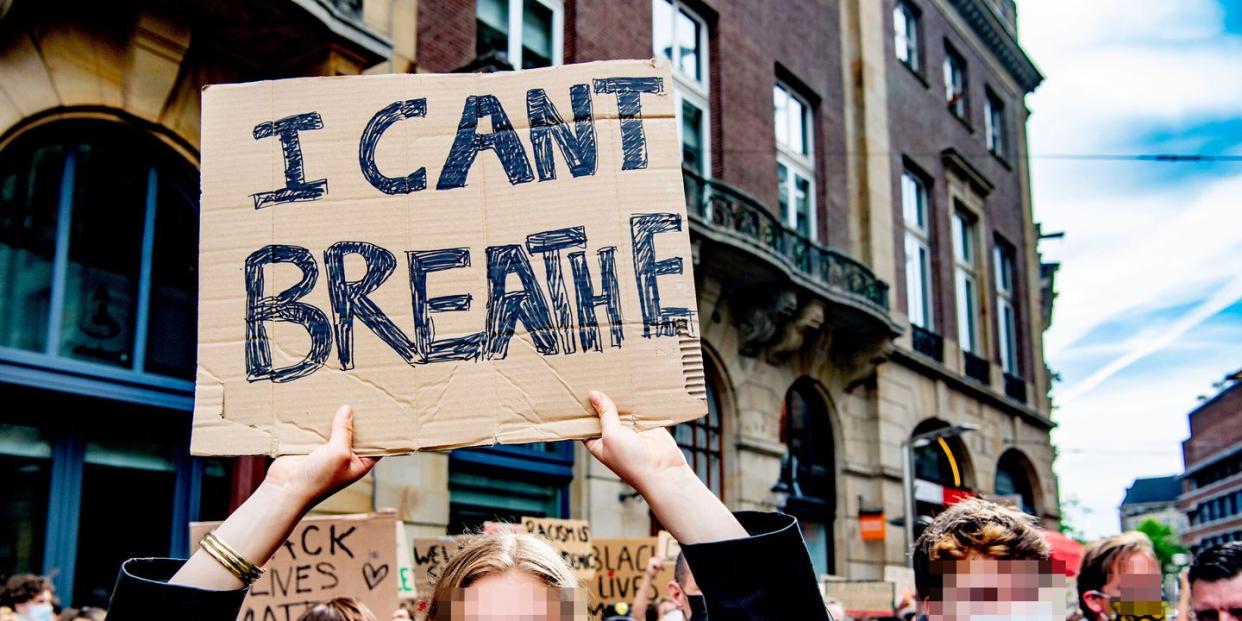Dear White Women: Acting Like An Anti-Racist Doesn’t Make You One

Over the past week, you may have seen your Instagram Stories feed flooded with white people who are “coming to terms with my privilege” through images of designed charts, stacks of books, and suggested charities to support. On Tuesday, maybe your main feed was probably clogged by white women (not to mention, brands, fitness studios, and corporations) sharing black squares with “#BlackoutTuesday” in the caption. Maybe you posted these things too.
You mean well. You agree, of course, that Black lives matter. But as white women, our next phase of work is owning up to a repost not being enough. They’re performative. Yes, we want to be part of this collective mourning. But it can also be harmful to our friends in the Black community. Instead, let’s consider how our actions off the Instagram stage can speak louder than words.
As we all witness the uprooting of an old world order, American white women have a particular role to play, that for some, might be new and uncomfortable.
On top of this, there’s the historical image of “vulnerable and virtuous” white wives that we must protect at all costs. Fast-forward to the present, and we have Karen memes, the BBQ Beckys, the Amy Coopers of Central Park.
So what do we do to confront this history? We shed the copy-and-paste mentality of reposting and sharing what looks to be on-script for our required behavior. We get over the fact that no book, no class, no podcast, no fill-in-the-blank is going to make us less biased. We get clear on the resource we have to offer—yes money, votes, voices, and our bodies at protests, but, what else? There is no clear map for a conversation like this that has been happening for a long time; there is no perfect ally, activist, organization, or well-articulated debate. Nothing surface-level will save you from the real work if that’s what you’re genuinely here to do.
Right now, white women’s call to action is not to make verbal commitments. It is to change. In fact, people in your social media community, particularly people of color, might be exhausted from watching us all come to epiphanies about inequality or our complicity. The violence committed toward Black and brown people has been screamingly obvious, but just slightly out of earshot that we never actually were pulled to inquire further. And, for some, it’s clear that when we did see and hold momentary compassion for the individual, their family, and the complicated circumstances, we still turned away, because, well, what can I really do that would make a difference?
Let’s all acknowledge the lameness of this response for a second. The stories and data have always been within our reach and there was, in fact, always something you could do about it.
The best apology for not seeing what was so obvious to so many is changed behavior.
When I began my journey as a “well-intended white woman,” I was thrown off track by this concept because throughout my entire life, I had followed all the “rules” around being “good.” Everyone is equal, I thought. “I don’t see color.” Even if I didn’t mean those sentiments, I was at least delivering the script society had given me since I was a kid.
Now, as so many white women are finally bearing witness to the horrors of living in the United States as a person of color, we find ourselves with a new set of performance requirements. This time, I’m asking us not to get in line behind each other and do what we’ve done so uniformly in the past—moving in lockstep with the person in front, so as not to be noticed or draw attention to anything unsorted.
This time, sit back, own your biases—we all have them—and observe what should have made you rage well before you heard the names Ahmaud Arbery, Breonna Taylor, and George Floyd. Take deep dives into the online communities you’ve ignored for years. Watch (don’t repost), witness, and understand the violence on the front doorstep of so many communities in this country.
Read the books you might have been assigned in high school but didn’t absorb. Pick up the new authors whose names and book titles have been flying across social media at lightning speed the past few weeks. And no, you don’t need to ask your Black friend to spend hours putting together a reading list for you. Do the work to find one yourself.
Stop focusing on immediate gratification that allows you to feel like you’re part of the solution because now you can “see” it and, instead, listen to and amplify those who have been fighting for racial equality long before you realized you should join in outside of the occasional march or vote.
American white women are arguably one of the most powerful demographic groups in the world—remember, nearly half voted for Donald Trump in 2016. But we also often opt for the safest route of civic expression. The consequences may have seemed superficial in the past, but it’s time to realize that they can be dangerous and, as we know, deadly.

You Might Also Like